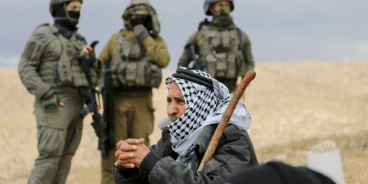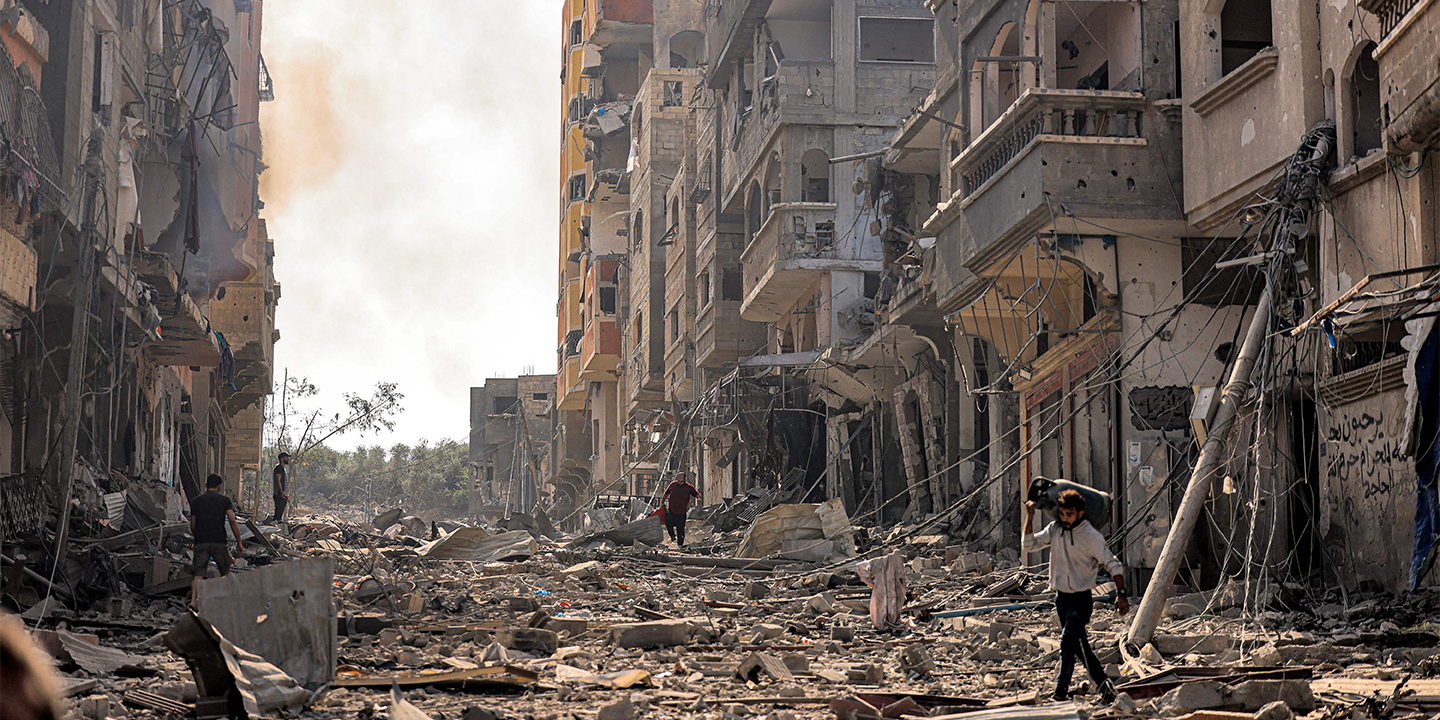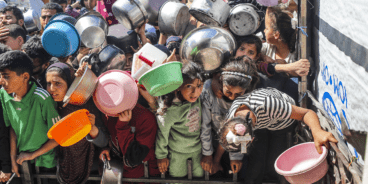

Atrocity Alert No. 369: Israel and the Occupied Palestinian Territory, Myanmar (Burma) and Mali
Atrocity Alert is a weekly publication by the Global Centre for the Responsibility to Protect highlighting situations where populations are at risk of, or are enduring, mass atrocity crimes.
PALESTINIANS FACE MAN-MADE HUMANITARIAN CATASTROPHE AMID ATROCITY CRIMES IN GAZA
Relentless Israeli airstrikes over the past 12 days on Gaza have targeted civilians and destroyed civilian objects protected under International Humanitarian Law, including residential buildings, hospitals, mosques, water and sanitation facilities and refugee and displacement camps. Such indiscriminate attacks likely amount to war crimes. At least 3,000 Palestinians have been killed and over 12,500 injured since 7 October, with an additional 1,200 missing and trapped under the rubble of destroyed buildings.
On 17 October strikes hit al-Ahli Arab Hospital in Gaza City, killing and injuring over 500 people, including patients and medical workers. The Ministry of Health in Gaza immediately reported that the hospital had been targeted by an Israeli airstrike. Israeli government officials later denied responsibility and blamed the attack on misfired rockets launched by the Palestinian Islamic Jihad, who in turn denied responsibility. Impartial verified evidence and access for foreign journalists and independent investigators is extremely limited. Al-Ahli Arab Hospital was one of 20 hospitals in the north of the Gaza Strip facing evacuation orders from the Israeli military as airstrikes escalated.
Israel’s attack on the Gaza Strip comes after Hamas and other Palestinian armed groups launched a deadly assault into Israel on 7 October. Militants attacked civilian areas and perpetrated flagrant violations of international law that likely amount to war crimes and crimes against humanity, including mass summary killings of civilians, abductions and hostage-taking and physical abuse. At least 1,300 Israelis have been killed and over 4,229 injured, including many children. Hamas has continued to fire indiscriminate rockets at Israel since 7 October.
Israel’s retaliatory indiscriminate attacks have exacerbated a mounting humanitarian catastrophe in the blockaded and besieged Gaza Strip, where suffering has reached alarming levels. Since announcing the complete siege of Gaza on 9 October, Israel has halted the flow of food, water, fuel and aid to trapped Palestinians, while the lack of electricity has contributed to the collapse of health, water and sanitation services. The shortage of potable drinking water has put millions of Gazans at risk of dehydration and contracting water-borne diseases. On 16 October Israel opened a single water line in southern Gaza for three hours, benefiting only 14 percent of the population.
Philippe Lazzarini, Commissioner General of the UN Relief and Works Agency for Palestine Refugees, said, “The scale and speed of the unfolding humanitarian crisis is bone-chilling. Gaza is fast becoming a hell-hole and is on the brink of collapse.” Israeli authorities have closed the crossings between Gaza and Israel while the only remaining route, the Rafah Crossing into Egypt, was forced to shut down after being targeted by Israeli airstrikes.
Resource shortages, constant bombardments and movement restrictions have severely limited the delivery of life-saving aid. Thus far there has been no guarantee of safe passage of humanitarian aid into Gaza, and the Rafah Crossing remains closed as Egypt awaits these guarantees. The United States (US) announced it would “develop a plan” with Israel to allow humanitarian aid delivery to civilians in Gaza while the European Union (EU) has announced the establishment of a “humanitarian air bridge.”
The calamitous humanitarian situation in Gaza is a direct result of indiscriminate bombing and the collective punishment of Palestinians. At the outset of the crisis third party states, including the US and EU, failed to urge Israel to ensure operations against Hamas abide by international law and do not result in disproportionate harm to civilians. The siege of Gaza likely amounts to intentional starvation of civilians as a method of warfare – a war crime – and may amount to a crime against humanity. Israeli authorities must allow access for independent monitors to investigate the attack on al-Ahli Arab Hospital. Hostilities must immediately end to prevent further suffering and likely atrocities. All relevant parties must urgently guarantee safe and unimpeded access for humanitarian aid to the Gaza Strip.
MYANMAR JUNTA PERPETRATES DEADLY STRIKE ON A DISPLACEMENT CAMP
On 9 October at least 27 people, including 11 children, were killed and a further 60 injured in a strike on a displacement camp in the village of Mung Lai Hkyet in Myanmar’s (Burma) northern Kachin State. The strike caused widespread destruction of buildings and shelters in the area. Preliminary investigations by international human rights organizations have concluded that the camp was initially hit by a military airstrike followed by a ground assault with artillery. Although the camp is located about three miles from Laiza, the headquarters of the Kachin Independence Army – an ethnic armed group currently fighting against the military junta – investigations did not show any resistance activity in the area. Indiscriminate attacks on civilians and displaced persons are prohibited under international law and may amount to war crimes.
The Mung Lai Hkyet attack demonstrates the military junta’s continual and increasingly widespread pattern of attacks on civilians or civilian areas since the February 2021 coup. In his most recent report to the Human Rights Council (HRC) last month, the UN High Commissioner for Human Rights, Volker Türk, decried the increasing systematic use of airstrikes, mass killings and arson against the civilian population. The junta reportedly launched 687 airstrikes from 1 April 2022 to 31 July 2023, more than double the number carried out in the first 14 months following the coup. In an address to the HRC, High Commissioner Türk further outlined the “appalling methods” used by the military “to inflict unimaginable pain on their victims, including burning them alive, dismembering, raping, beheading, bludgeoning, and using abducted villagers to shield themselves against attacks and landmines. This is inhumanity in its vilest form.”
The strike has reignited calls for a coordinated international response to the crisis in Myanmar. In his most recent report, published on 12 October, the UN Special Rapporteur on the situation of human rights in Myanmar, Tom Andrews, urged the international community to heed High Commissioner Türk’s call for “new thinking” to address the crisis. Special Rapporteur Andrews outlined how the international community should “deprive the [junta] of the three things that it needs to sustain itself: finances, weapons, and legitimacy.”
Jaclyn Streitfeld-Hall, Director of Policy and Research at the Global Centre for the Responsibility to Protect, said, “The international community needs to be more strategic in how it responds to protect civilians at risk in Myanmar. States should work together to streamline, coordinate and expand sanctions regimes, including through imposing a global arms embargo and sanctioning the jet fuel used to bomb civilians. We cannot allow these crimes to continue.”
INTENSIFYING VIOLENCE THREATENS TO PLUNGE NORTHERN MALI INTO A NEW CRISIS
On 14 October the UN expressed grave concern regarding increasing armed presence in northern Mali amid intensifying tensions and violence. Since August the Malian army (FAMa), accompanied by mercenaries from the Wagner Group, have clashed with the Permanent Strategic Framework (CSP), a collection of armed movements that were all signatories to the 2015 Algiers Agreement. Hostilities and airstrikes have significantly escalated in recent weeks. The unprecedented fighting threatens to undermine the peace agreement, which ended the 2012-2014 conflict between the FAMa and armed movements, and poses significant threats to the stability and security of Mali.
The latest violence was precipitated in part by the withdrawal of the UN peacekeeping mission in Mali (MINUSMA), which helped maintain a fragile calm in the north. Following a request by Malian authorities for the withdrawal of MINUSMA, the Mission began transferring 12 military bases to the Malian authorities in July. However, several bases are in areas under the control or influence of armed groups, which led to increased tensions, including the eruption of intense clashes in August over control of a UN site in Ber.
The resumption of fighting has inflicted a heavy toll on populations. Attacks in northern Mali have more than doubled since UN peacekeepers completed the first phase of the withdrawal in August. Since then, 400 people, nearly half of whom were civilians, have been killed during the hostilities, according to the Armed Conflict Location & Event Data Project. Dozens of arrests and extrajudicial killings have been reported. In response to a “rapidly deteriorating security situation” and to ensure the safety of hundreds of peacekeepers, on 16 October MINUSMA announced its accelerated withdrawal from the Tessalit and Aguelhok camps in the Kidal region, a rebel stronghold. Increased FAMa presence in Kidal has prompted fears of further violence and a turning point in the conflict.
Compounding these clashes are growing attacks by armed Islamist groups, particularly al-Qaeda affiliated Jama’at Nusrat al-Islam wal Muslimin (JNIM), in the Gao and Timbuktu regions where they have imposed months-long blockades. JNIM frequently perpetrates targeted shelling of Timbuktu, hitting civilian property and attacking transport. In one of the deadliest incidents in the ongoing surge of violence, at least 49 civilians were killed when a river boat was shelled during September. Meanwhile, most MINUSMA convoys have been unable to move out of Gao or Timbuktu.
A prolonged confrontation between the CSP and military government will expose communities to grave risks and likely provide an opportunity for armed Islamist groups to consolidate and expand their areas of influence. Malian authorities and the CSP should take steps towards de-escalation, including agreeing on an immediate truce and a lasting ceasefire. All parties are obligated to refrain from any action that could jeopardize the safe and timely withdrawal of MINUSMA.
Related Content


Gaza: Starvation or Gunfire - This is Not a Humanitarian Response
